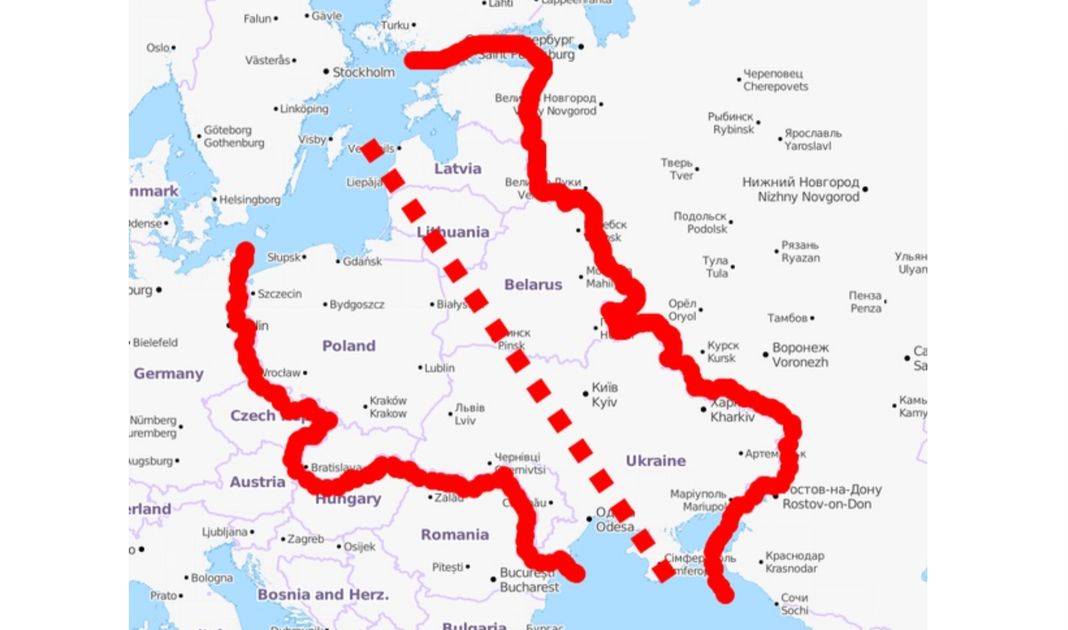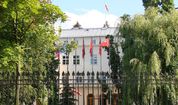Intermarium Weekly 11-18.03.2020

(wikimedia.org)
Europe as fertile soil for Coronavirus…
As of Wednesday 18th March, there are 287 confirmed cases of SARS-CoV-2 infections in Poland with 5 deaths. Eventually, coronavirus panic reached Eastern Europe. In general, the entire European continent became the most dangerous region in the world in terms of the spread of the disease. If China seems to have managed to contain the virus, in Europe coronavirus has found apparently more fertile soil for its expansion. A state of emergency has been declared in all the Intermarium countries. Economists expect the region may – in the best-case scenario – face a GDP decrease of around 1-2.5%.
The four main challenges are as follows:
(1) To maintain normal functioning of state institutions when high level civil servants are at risk of infection;
(2) To maintain countries’ medical health systems facing such an unprecedented stress test;
(3) To maintain social and political order (police and other agencies);
(4) To maintain supply chains, especially food, energy and pharmaceuticals.
The following statistics represents the current situation with confirmed cases of coronavirus infection in the Intermarium Region:
| One week ago | 18.03 | |
| Romania | 13 | 184 |
| Estonia | 10 | 225 |
| Belarus | 6 | 36 |
| Poland | 5 | 238 |
| Hungary | 4 | 25 |
| Ukraine | 1 | 14 |
| Lithuania | 1 | 25 |
| Latvia | 1 | 49 |
| Slovakia | 1 | 44 |
| Bulgaria | 0 | 37 |
| Moldavia | 30 | |
| Czech Republic | 396 | |
| Slovakia | 72 | |
| Hungary | 50 |
International trade in the European Union and Europe at large is under threat. The Schengen Zone and the principle of freedom of movement (of both work force and goods) has almost collapsed, and we are all going to witness the results of this collapse in the very near future. Countries are closing their borders and establishing a special regime which is meticulously investigating which products or goods are leaving and entering. Everything which can be used for the purposes of fighting the coronavirus is not allowed to be exported.
On the wave of recent reports, a number of European countries have decided to introduce drastic solutions. Poland introduced significant restrictions in two stages; first on Wednesday nationwide school closures were announced, then Friday saw the declaration of a state of epidemiological threat, and thus – among other things – the closing of borders. A similar decision was also made by the Czech Republic, Ukraine and Slovakia. The result of the announcement by the Polish government of the decision to close schools, universities, museums and other public institutions was “panic buying”. However, before accusing Poles of the often-assigned national vices, it is worth noting that also on Wednesday exactly the same decision was made by the government of the Kingdom of Denmark – and the reaction of Danish society was identical. The emptiness of store shelves throughout Europe has come to symbolise the atavistic reaction of an on-the-go consumerist society staring quietly into the abyss. Toilet paper has – inexplicably – become a luxury item.
Further information is also emerging regarding government responses in economic terms. On Thursday, contrary to investors’ hopes, the European Central Bank decided not to cut interest rates, and only supported banks with additional funds to ensure their liquidity. ECB head Christine Lagarde announced that it is national governments that are responsible for the condition of their economies, thus pouring a solid dose of soothing oil on the flames of panic and already-simmering European markets. As if in response to this on Friday, the European Commission announced the establishment of an investment initiative worth EUR 37 billion to minimise the economic impact of the pandemic.
However, the amount saved by the EU pales in comparison to the one declared by the German government; on Friday, the German economy and energy minister Peter Altmaier announced that the German development bank KfW could allocate EUR 550 billion to help the German economy. Referring to an earlier decision of the FED, Altmaier stated that this is a German bazooka that can still be “reloaded”.
On Wednesday 18th, the Polish government also took a page from Berlin’s book, announcing a stimulus package (dubbed “the fiscal shield”), worth just over 47 bn EUR. The stimulus is supposed to be comprised of five pillars, consisting of monetary support for private enterprises (including, inter alia microloans and loan guarantees), medical care (additional funding of PLN 7.5 billion), increased public spending (PLN 30 bn to be used for infrastructure development) as well as measures aimed at protecting the labour force (the government will provide partial reimbursement of wages).
In addition to that, the Polish Central Bank (NBP) has also lowered interest rates (for the first time in 5 years). Moreover, to ensure uninterrupted liquidity of the banking sector, the NBP has also reintroduced Poland’s very own repo market; it will be comprised of 7.3 billion PLN, with a four-day maturity at 1.5%. This is the first time in over a decade that Polish Central Bank has engaged in repo operations.
Protectionism and isolationism are the only options which will help contain the virus, but such measures are undertaken without any clear understanding of what will happen next and how all this is going to end up. The most striking problem is the future of supply chains in Europe, especially in Eastern and Central Europe.
“Coronabusiness”
In Ukraine, this has become a popular business and “mask smuggling” in particular. For example, in Kiev alone the local police arrested people for smuggling more than 100,000 masks. Criminal groups are trying to establish control over the mask market in Ukraine. Ukrainian smugglers tried to send more than 50,000 masks to Poland. At Kiev airport, smugglers tried to send 2 tons of masks to Italy.
Ukraine
Until now Ukraine has a small number of coronavirus cases, but this has the potential to increase significantly because of the huge numbers of people returning from the countries which have substantial numbers of infected, like Italy, France or Germany. Only from 16 to 17 March almost 100,000 people returned from the European Union. The situation with thousands of Ukrainians in Poland, gathered on the Polish-Ukrainian borders and wanting to enter Ukraine, is particularly problematic. According to the existing regulations, all these people must be quarantined. However, it is more likely that Ukraine will not be able to quarantine them all and this will cause a further spreading of the virus in the country. Ukraine expects the IMF to help Ukraine by providing financial and humanitarian assistance for tackling the crisis.
On 13 March, in Minsk a meeting of the Trilateral Contact Group on Ukraine was held. The parties apparently agreed to treat the two Ukrainian separatist regions as legitimate sides of the conflict. This triggered serious outrage in Ukraine, since from 2014 onwards Kiev has denied the separatist regions the status of being a part of the conflict. The Ukrainian strategy was that this is a Ukrainian-Russian war, and the separatists are only Russian proxies in the conflict, but it seems that Kiev under Zelensky is changing the Ukrainian position on this issue. In a new agreement, Russia will be the “guarantor-observer” country. This is a favourable outcome for Russia and a defeat to Ukraine. Russia will now be regarded as “a peacekeeper” between the two conflicting sides of the “Ukrainian Civil War.”
Belarus and the Union State
The quarrels between Belarus and Russia took a new and interesting “corona” dimension. Moscow without any consultations closed the borders with Belarus because of the coronavirus. Belarusian President Lukashenka was outraged by these unilateral actions of Russia. Both countries have been members of the Union State for many years, enjoying freedom of movement and do not (normally) operate border control between states.
On Friday, March 13, US Secretary of State Mike Pompeo and the head of the Belarusian Ministry of Foreign Affairs Vladimir Makiej discussed the prospective supplies of US oil to Belarus; the day before, the first tanker transporting the first batch of Belarus-bound Azerbaijani oil arrived at the port of Odessa. On the same day, Belneftchim announced that the Odessa-Brody pipeline, which is to delivered oil to the Mozyr refinery, has been inspected, and is ready for operation. Lastly, it is also worth adding that in the last Russian week, Duma adopted new regulations meant to simplify the process of issuing Russian passports to the Belarusians – and as history has proven, Russia is ready to defend the fundamental rights of its minorities to the last bullet, whether they are threatened or not.
Ukraine
The governments of the United States and Ukraine agreed on the supply of liquefied gas to Ukraine through terminals in Poland in the amount of 6-8 billion cubic meters annually with its subsequent transportation to European countries through a hub based on Ukrainian underground storage facilities. Ukraine has already signed a letter of intent (LOI) with Louisiana natural gas Exports, Inc.
If realised, this will be an unprecedented full-scale project that will strengthen the energy and geopolitical independence of the European countries from the Russian Federation, and will also have a great economic effect. According to the Ukrainian Government, “This is a matter of energy independence and security of our country and the region as a whole.” The project can be completed within two-to-three years. Ukraine has the largest gas storage facilities in the world, is ready to receive such a volume of gas in the near future, and this does not require significant investments in infrastructure. The only problem is the limited amount of pipeline capacity from Poland, which allows for the transportation of up to 2 billion cubic meters of gas.
In Ukraine, a Chinese citizen was imprisoned for espionage for up to ten years. The spy, according to Ukrainian SBU, worked as a PhD scientist in technical sciences, carried out intelligence activities under the guise of official scientific and technical cooperation between China and Ukraine. It is reported that during business trips to Ukraine, the spy tried to persuade a group of domestic scientists to confidential cooperation. He tried by use of bribes to obtain materials of secret developments in the rocket and space industry of Ukraine.
Autor
Ridvan Bari Urcosta
Senior Analyst at Strategy&Future






Trwa ładowanie...